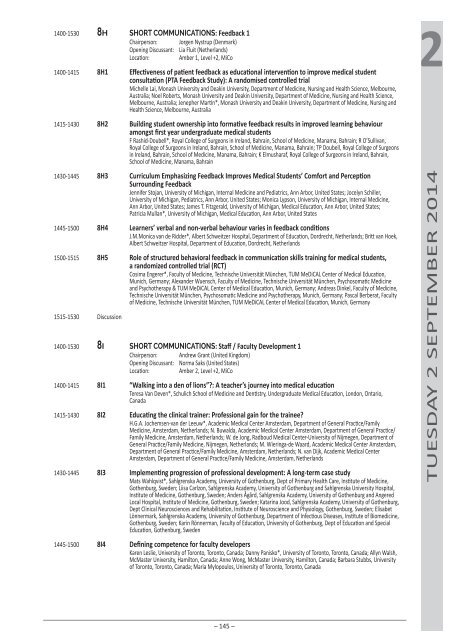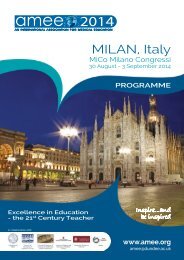Ac1xd
Ac1xd
Ac1xd
Create successful ePaper yourself
Turn your PDF publications into a flip-book with our unique Google optimized e-Paper software.
2TUESDAY 2 SEPTEMBER 20141400-1530 8H SHORT COMMUNICATIONS: Feedback 1Chairperson: Jorgen Nystrup (Denmark)Opening Discussant: Lia Fluit (Netherlands)Location:Amber 1, Level +2, MiCo1400-1415 8H1 Effectiveness of patient feedback as educational intervention to improve medical studentconsultation (PTA Feedback Study): A randomised controlled trialMichelle Lai, Monash University and Deakin University, Department of Medicine, Nursing and Health Science, Melbourne,Australia; Noel Roberts, Monash University and Deakin University, Department of Medicine, Nursing and Health Science,Melbourne, Australia; Jenepher Martin*, Monash University and Deakin University, Department of Medicine, Nursing andHealth Science, Melbourne, Australia1415-1430 8H2 Building student ownership into formative feedback results in improved learning behaviouramongst first year undergraduate medical studentsF Rashid-Doubell*, Royal College of Surgeons in Ireland, Bahrain, School of Medicine, Manama, Bahrain; R O’Sullivan,Royal College of Surgeons in Ireland, Bahrain, School of Medicine, Manama, Bahrain; TP Doubell, Royal College of Surgeonsin Ireland, Bahrain, School of Medicine, Manama, Bahrain; K Elmusharaf, Royal College of Surgeons in Ireland, Bahrain,School of Medicine, Manama, Bahrain1430-1445 8H3 Curriculum Emphasizing Feedback Improves Medical Students’ Comfort and PerceptionSurrounding FeedbackJennifer Stojan, University of Michigan, Internal Medicine and Pediatrics, Ann Arbor, United States; Jocelyn Schiller,University of Michigan, Pediatrics, Ann Arbor, United States; Monica Lypson, University of Michigan, Internal Medicine,Ann Arbor, United States; James T. Fitzgerald, University of Michigan, Medical Education, Ann Arbor, United States;Patricia Mullan*, University of Michigan, Medical Education, Ann Arbor, United States1445-1500 8H4 Learners’ verbal and non-verbal behaviour varies in feedback conditionsJ.M.Monica van de Ridder*, Albert Schweitzer Hospital, Department of Education, Dordrecht, Netherlands; Britt van Hoek,Albert Schweitzer Hospital, Department of Education, Dordrecht, Netherlands1500-1515 8H5 Role of structured behavioral feedback in communication skills training for medical students,a randomized controlled trial (RCT)Cosima Engerer*, Faculty of Medicine, Technische Universität München, TUM MeDiCAL Center of Medical Education,Munich, Germany; Alexander Wuensch, Faculty of Medicine, Technische Universität München, Psychosomatic Medicineand Psychotherapy & TUM MeDiCAL Center of Medical Education, Munich, Germany; Andreas Dinkel, Faculty of Medicine,Technische Universität München, Psychosomatic Medicine and Psychotherapy, Munich, Germany; Pascal Berberat, Facultyof Medicine, Technische Universität München, TUM MeDiCAL Center of Medical Education, Munich, Germany1515-1530 Discussion1400-1530 8I SHORT COMMUNICATIONS: Staff / Faculty Development 1Chairperson: Andrew Grant (United Kingdom)Opening Discussant: Norma Saks (United States)Location:Amber 2, Level +2, MiCo1400-1415 8I1 “Walking into a den of lions”?: A teacher’s journey into medical educationTeresa Van Deven*, Schulich School of Medicine and Dentistry, Undergraduate Medical Education, London, Ontario,Canada1415-1430 8I2 Educating the clinical trainer: Professional gain for the trainee?H.G.A. Jochemsen-van der Leeuw*, Academic Medical Center Amsterdam, Department of General Practice/FamilyMedicine, Amsterdam, Netherlands; N. Buwalda, Academic Medical Center Amsterdam, Department of General Practice/Family Medicine, Amsterdam, Netherlands; W. de Jong, Radboud Medical Center-University of Nijmegen, Department ofGeneral Practice/Family Medicine, Nijmegen, Netherlands; M. Wieringa-de Waard, Academic Medical Center Amsterdam,Department of General Practice/Family Medicine, Amsterdam, Netherlands; N. van Dijk, Academic Medical CenterAmsterdam, Department of General Practice/Family Medicine, Amsterdam, Netherlands1430-1445 8I3 Implementing progression of professional development: A long-term case studyMats Wahlqvist*, Sahlgrenska Academy, University of Gothenburg, Dept of Primary Health Care, Institute of Medicine,Gothenburg, Sweden; Liisa Carlzon, Sahlgrenska Academy, University of Gothenburg and Sahlgrenska University Hospital,Institute of Medicine, Gothenburg, Sweden; Anders Ågård, Sahlgrenska Academy, University of Gothenburg and AngeredLocal Hospital, Institute of Medicine, Gothenburg, Sweden; Katarina Jood, Sahlgrenska Academy, University of Gothenburg,Dept Clinical Neurosciences and Rehabilitation, Institute of Neuroscience and Physiology, Gothenburg, Sweden; ElisabetLönnermark, Sahlgrenska Academy, University of Gothenburg, Department of Infectious Diseases, Institute of Biomedicine,Gothenburg, Sweden; Karin Rönnerman, Faculty of Education, University of Gothenburg, Dept of Education and SpecialEducation, Gothenburg, Sweden1445-1500 8I4 Defining competence for faculty developersKaren Leslie, University of Toronto, Toronto, Canada; Danny Panisko*, University of Toronto, Toronto, Canada; Allyn Walsh,McMaster University, Hamilton, Canada; Anne Wong, McMaster University, Hamilton, Canada; Barbara Stubbs, Universityof Toronto, Toronto, Canada; Maria Mylopoulos, University of Toronto, Toronto, Canada– 145 –



